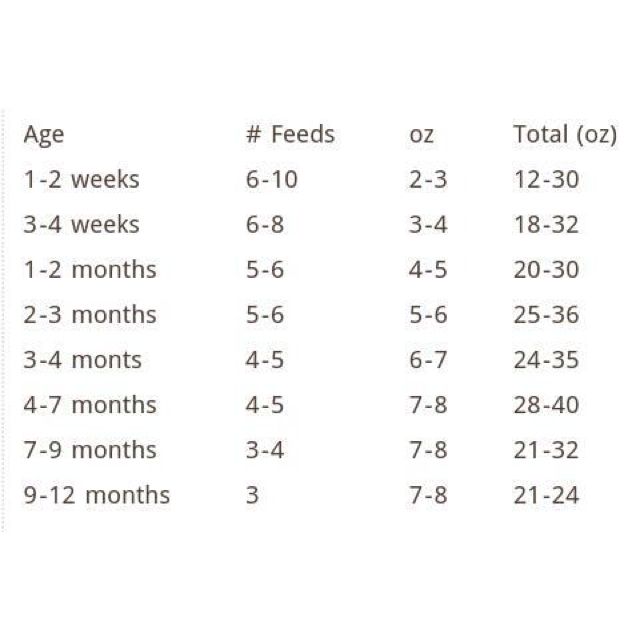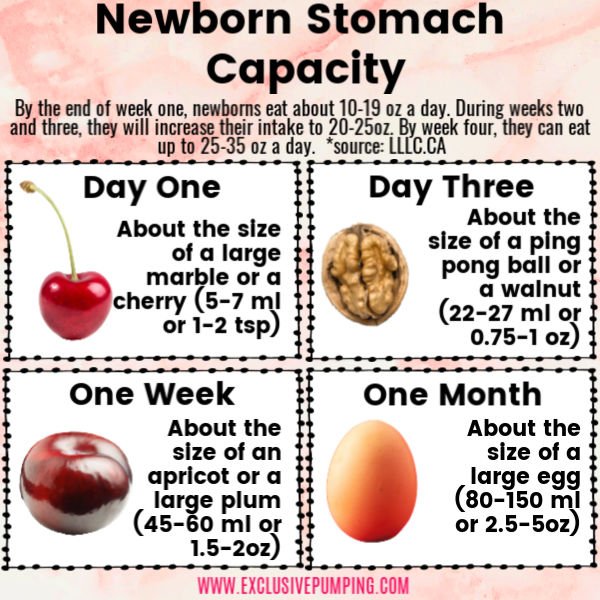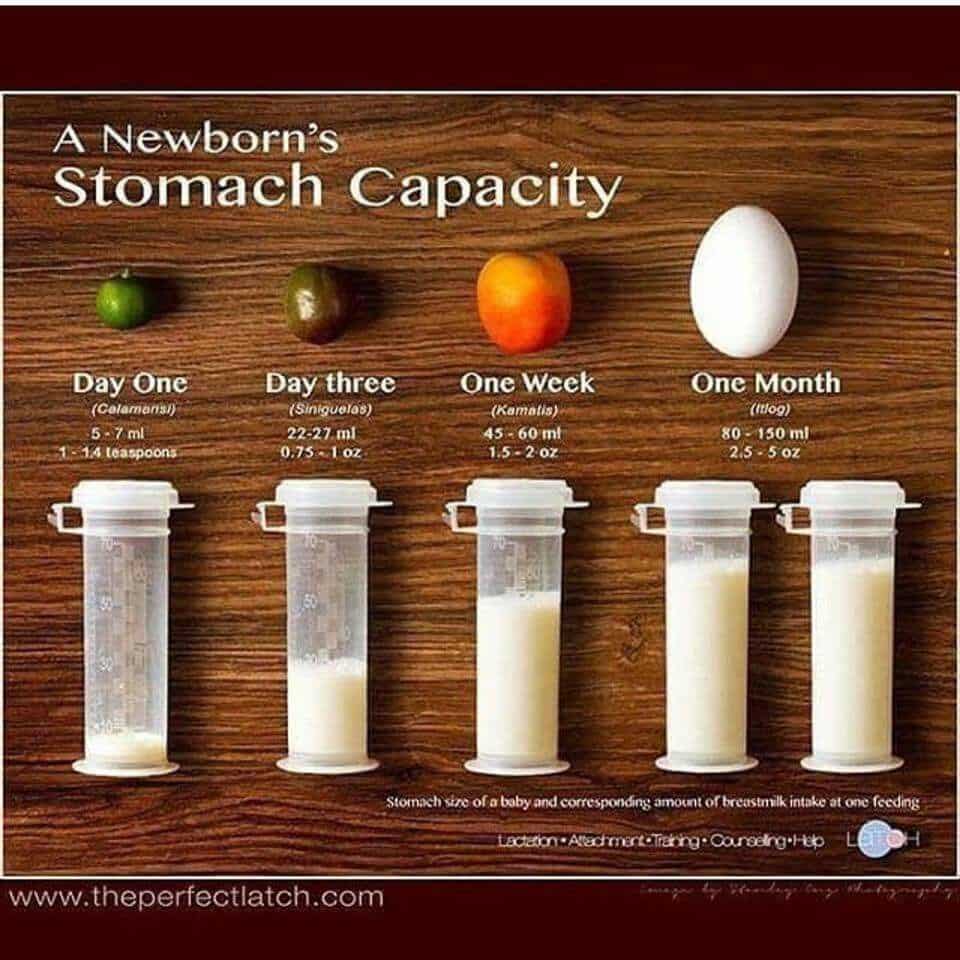Sample Baby Feeding Schedules
Here are some sample feeding charts that illustrate what an average day might look like when feeding your infant. Keep in mind though that every baby is different, so your baby may eat more or less than what is listed here. If you want a more personalized chart, talk to your pediatrician about what you should expect with your baby.
Should I Worry About Spitting Up
It’s normal for infants to “spit up” after eating or during burping. Spitting up a small amount usually less than 1 ounce shouldn’t be a concern as long as it happens within an hour of feeding and doesn’t bother your baby.
You can reduce spitting up in these early months by:
- feeding before your baby gets very hungry
- keeping your baby in a semi-upright position during the feeding and for an hour after
- burping your baby regularly
- avoiding overfeeding
- not jostling or playing vigorously with your baby right after a feeding
If your baby seems to be spitting up large amounts, is spitting up forcefully, is irritable during or after feedings, or seems to be losing weight or is not gaining weight as expected, call your doctor. And if your child has a fever or shows any signs of dehydration , call the doctor right away.
Signs Your Baby Is Hungry
Learning your baby’s hunger cues helps you determine when they are ready to eat . Plus, recognizing hunger cues can help you get your baby fed before they start crying. Here are some signs that your baby might be ready to eat:
- Showing signs of the rooting reflex
- Licking their lips
- Sucking on their hands or anything within reach like your arm or shirt
- Nuzzling against your breasts
- Licking their lips
- Being fussy or crying
If you notice these signs you may want to offer your baby the breast or a bottle, depending on your preferred method of feeding.
Also Check: How Much Does It Cost To Adopt A Newborn
Guide For Formula Feeding
- When breast milk is not available, standard infant formula is an appropriate alternative for most healthy full term infants, but there are some differences between brands. Do not hesitate to ask your health care provider for a recommendation if you are unsure which formula to use.
- Bottle-feeding should be interactive, with the caregiver holding both the bottle and the infant. Propping a bottle has been linked to an increased risk of ear infections and tooth decay.
- Formula feeding should be in response to the infants needs and not based on a predetermined schedule. Look for cues of hunger and fullness to determine both when to feed and how much. The number of wet diapers per day and your childs growth will reflect if he or she is getting enough formula. The chart below demonstrates common intakes for infants at various stages. However, ask your health care provider if you have any questions about how much formula your infant is taking.
- The amount of formula an infant takes will decrease as the baby increases intake of solid foods, but formula remains a significant source of calories, protein, calcium and vitamin D for the first year of life.
- Ask your health care provider before switching an infant less than 1 year of age from formula to cows milk or a cows milk alternative.
| Age |
|---|
Why Do Newborns Feed Often

Newborns need to eat often because their stomachs are small and can only hold tiny amounts of milk. Experts say that by 10 days of age, a babys tummy is about the size of a golf ball. And that golf ball would hold about 2 ounces.
Breastfed babies tend to eat more often than formula-fed babies because breast milk breaks down faster in their stomachs. Researchers have found that a newborns stomach capacity is about 20 milliliters , and it takes about an hour for a baby to digest this amount. This fits perfectly with a babys one-hour sleep cycle.
Formula takes longer to break down, so a formula-fed baby will not want to eat as often .
Read Also: How Many Oz Should A Newborn Eat A Day
What Does Baby Need When They Are 0
When you bring your baby home from the hospital, their primary needs are to be fed when hungry, have their diapers changed consistently, have their umbilical cord cared for, be put to sleep on their back, and, most importantly, to be cuddled and nurtured by their parent or parents. According to Dr. Danielle Roberts, a pediatrician in Zanesville, Ohio, this time period in a baby’s life can feel a little rough as everyone adapts, but it goes by quickly.
Follow Your Baby’s Lead
Remember, each baby is unique and will vary her intake from feeding to feeding, and day to day. Never force-feed her extra formula, and don’t leave her still smacking her lips for more. A baby who spits up often may do better with smaller, more frequent feedings. Or, consider using paced bottle feeding, a technique that allows your little one to control the pace of their meals and reduces overfeeding.
Read Also: How To Wrap A Newborn
How Much Should A Newborn Eat If They Are Formula Fed
With formula fed babies it is much easiest to work out how much they are eating in relation to their weight and age, as it can be precisely measured.
As an added bonus at the end of each feed, you are also able to see how much they have not consumed!
The following formula recommended by the American Academy of Paediatrics is a great way to calculate how much should a newborn eat if theyre formula-fed:
Ababy should consume, on average, about 2.5oz of formula a day for every pound of their body weight.
This will roughly equate to about 1-2oz of formula every 2-3 hours in the first couple of weeks, gradually increasing to 4-5oz every 4 hours by 12 weeks old.
How Much And How Often To Feed Infant Formula
Information about finding infant formula can be found here.external icon
Additional information to help families during the infant formula shortage can be found here.
alert iconCDCs investigation of Cronobacter infections in infants who consumed powdered infant formula from the Abbott Nutrition facility in Sturgis, MI, is now closed. No new cases have been identified. Get updates about FDAs investigationexternal icon.
Every baby is different. How much and how often your baby feeds will depend on your babys needs. Here are a few things to know about infant formula feeding during the first days, weeks, and months of your babys life.
You May Like: How Many Oz Of Formula For Newborn
How To Burp Your Baby
When burping your baby, repeated gentle patting on your baby’s back should do the trick. Cup your hand while patting this is gentler on the baby than a flat palm.
To prevent messy cleanups when your baby spits up or has a “wet burp,” you might want to place a towel or bib under your baby’s chin or on your shoulder.
Try different positions for burping that are comfortable for you and your baby. Many parents use one of these three methods:
If your baby seems fussy while feeding, stop the session, burp your baby, and then begin feeding again. Try burping your baby every 2 to 3 ounces if you bottle-feed and each time you switch breasts if you breastfeed.
- tends to be gassy
How Do I Know When My Baby Is Ready For Solid Food
Many healthcare providers recommend that you exclusively breastfeed your baby for the first six months of life. However, if youre not exclusively breastfeeding, your baby may be ready to start solid foods between four and six months.
Every baby develops differently, so here are signs to look for to know your baby is developmentally ready for solid food:
- Baby can sit upright with little or no support in the high chair.
- Baby has good head control for long periods of time.
- Baby is hungry for more nutrition after eight to 10 breastfeeding or 32 ounces of formula.
- Baby shows interest in what you are eating.
- Baby readily opens mouth to accept the spoon feeding.
For children with special needs, speak with your childs healthcare provider or therapists about seating/adaptive feeding. Please speak with your healthcare provider and/or dietitian if your baby was born early.
Read Also: How Do You Help Newborn With Constipation
Maintain Your Milk Supply While Giving Formula
If you wish to maintain your milk supply while giving formula, you may need to breastfeed or pump frequently, up to 8 to 12 times per day. The exact number of times will depend on your breasts storage capacity and the age of your baby.
According to the N.C.T., if your baby is older around 8 or 9 months you can usually maintain your breastmilk supply alongside formula feeding, as long as you breastfeed every day.
The Department of Agriculture has tips for maintaining your milk supply while introducing formula.
Dont Miss: How Long Are Babies In Newborn Diapers
How Often Should I Feed My Newborn

A general rule of thumb is that newborns should feed at least 8 times a day. However, just like for grown-ups, the appetites of newborns can vary, as some newborns might yearn for a meal just 90 minutes or so after their last, while others may wait up to three hours before requesting another feeding. The important thing is just to make sure that Baby gets plenty of milk to help him grow big and strong. This also means that while its difficult to put a newborn on a true feeding schedule, a newborn should generally never go more than four hours without eating, including overnight, although your pediatrician or lactation consultant may have recommendations that are more specific to Baby.
This should continue for the first 2 to 4 weeks, at which point Babys growing tummy will allow him to stay full for longer, and the frequency of his feedings should drop, though he may seem to regress at certain points and eat a bit more often, as a way of fueling a growth spurt.
Recommended Reading: How To Give Vitamin D Drops To Newborn
When Should You Start Feeding Your Newborn Baby
Newborns especially are most alert an hour or two after birth, which is why its important to start breastfeeding as soon as possible. If you miss that very active stage, your baby may be sleepier later, which makes it harder to practice latching on for that first initial feeding.
If your babys not showing signs of wanting to latch, you should continue to offer your baby the breast every two to three hours. It can take a lot of practice, so its important to be patient as your baby is figuring out the best way to latch.
Write down the feeding times and number of wet and dirty diapers your baby has had while youre in the hospital. Your nurse and doctor will be able to help you determine if your baby needs some additional encouragement to nurse or supplement.
How Many Times A Day Should I Pump While Breastfeeding
Most experts suggest it is best if mom can come close to matching what the normal nursing baby would do at the breast, and recommend she pump about every two hours, not going longer than three hours between sessions. Understanding how milk production works can help moms in their efforts to establish good milk supply.
You May Like: How Do I Get Insurance For My Newborn
Recommended Reading: How Many Diapers Do You Need For Newborn
How Much Formula Should I Give My Baby
Within the first few weeks, make two- to three-ounce bottles every two to three hours for your newborn. Increase this amount after adjusting to their eating patterns. Look for the following cues to know when to start increasing your little ones formula intake:
- Finishing a full bottle at each feeding
- Showing signs of hunger after each feeding
Newborns
Newborns drink about 1.5 to 3 ounces of formula every two to three hours. Increase the amount as your baby grows.
Two-Month-Old Babies
Two-month-old babies drink about 4 to 6 ounces of formula every three to four hours. Increase the amount when your baby is able to consume more formula at each feeding.
How Much Should Newborn Babies Eat The Day Theyre Born
You may be anxious about getting your baby started eating as soon as possible. But on the first day of life, its possible that your baby is just as tired as you after going through birth.
Its not uncommon for babies to be very sleepy in the first 24 hours of life. That first 24-hour period after birth can be a learning curve for the baby to literally learn how to eat and be alert enough to eat. Dont fret too much if your baby isnt showing interest in eating every two hours on schedule.
One study found that, on average, infants who were breastfed ate around eight times and had three wet or dirty diapers in the first 24 hours of life. This is less than theyll eat and eliminate later.
You may be shocked to see how little your newborn is actually eating through breastfeeding in that first day of life, too. This is normal so dont be worried. Keep in mind that until your milk comes in , your baby is drinking colostrum only.
Colostrum is like concentrated superfood full of calories and nutrients, which is why it is adequate even in its small amounts the first couple days. Think quality over quantity.
On average, a healthy newborn will only drink about a 1/2 ounce in colostrum over the first 24 hours of life. Of course, every baby is different.
Also Check: Can Newborn Fall Asleep With Pacifier
Recommended Feeding Guide For The First Year
Breast milk and formula are designed to be the primary sources of nutritionthroughout an infants first year of life. You should talk with your babyshealth care provider before starting solid foods. Solid foods should notbegin before age 4 months because:
- Breast milk or formula provide your baby with all the nutrients that are needed.
- Your baby isnt physically developed enough to eat solid food from a spoon.
- Feeding your baby solid food too early may result in poor feeding experiences and increased weight gain in both infancy and early childhood.
The American Academy of Pediatrics recommends that all infants,children and adolescents take in enough vitamin D through supplements,formula or cows milk to prevent complications from deficiency of thisvitamin. In November 2008, the AAP updated its recommendations fordaily intake of vitamin D for infants, children, and adolescents whoare healthy. It is now recommended that the minimum intake of vitamin Dfor these groups should be 400 IU per day, beginning soon after birth.Your babys health care provider can recommend the proper type andamount of vitamin D supplement.
When Do I Start Timing Feeds
Every baby is different and their appetites vary massively, so it can be normal for them to take more or fewer feeds than the guide above suggests. Your baby won’t always wake at an exact time after their previous feed is finished. If youre able to, try and time your babys feeds from the moment you start until the beginning of the next feed . So if you feed your baby at 12 noon and they go back to sleep at 1pm, expect to feed them again at about 4pm. If your baby does follow a routine of feeding every three hours, youre going to be very busy, particularly in the early months!
You May Like: What Foods Make Newborn Gassy Breastfeeding
What Type Of Bottle And Formula Is Best For My Premature Infant
Whether you give breastmilk or formula in a bottle, you should use a slow flow bottle nipple designed for premature infants. These bottle nipples help prevent your baby from getting more liquid than they can handle at once.
Most premature babies will use a special formula designed for preterm babies. Your pediatrician or neonatologist can recommend the right formula for your baby’s needs. Depending on your baby’s diet, they can also advise if any other nutritional supplements are needed, such as vitamin D or iron.
Birth To The First Month

The first month is difficult for mom and baby because you are both trying to adjust to this new life. Your newborn will be feeding what seems like all the time, and it can be hard to catch a break.
Take Note
You should establish on-demand feeding with your baby if you are breastfeeding because it will help maintain your supply and keep your baby in control of the intake. Your baby may simply want a snack or a drink instead of a meal.
Recommended Reading: Why Does My Newborn Pass So Much Gas
How Many Ounces Do Formula
The American Academy of Pediatrics explains that after the first few days, your formula-fed newborn will drink around 2 to 3 ounces of formula with every feeding.
Theyll need to eat about every three to four hours. This is compared to a breastfed baby, who will usually eat every two to three hours.
